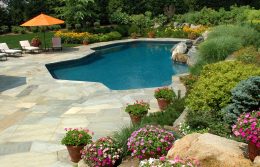How to Start Ecological Gardening
There are many reasons to try ecological gardening practices. Maybe you want to conserve water and lower your bills. Maybe it’s simple Texas pride, and you want to transition your yard to plants that reflect the topographical region you live in.
Whatever your reason, ecological gardening can be simple thanks to a few basic tips for preparing your soil and choosing your plants. Here’s where to begin.
Why Ecological Gardening?
Ecological gardening attempts to be more sensitive to the way the natural environment supports the things growing in your yard, harnessing natural approaches toward landscaping and gardening.
Ecological gardening utilizes native plants that create habitats for local wildlife, collect and conserve rainwater, and respond to changing seasons. It also helps remove invasive plants that damage or overrun local ecosystems. Put simply, ecological gardening means creating a garden that’s more resilient and sustainable.
Prepare Your Soil
All it takes to establish your ecological garden is a fresh start for your little plot of land. One of the main principles of ecological gardening is managing your “inputs” — that is, what you add to the earth to help your plants grow. That begins with proper soil maintenance. Here’s how to prepare your soil for your new garden.
- Solarize. Water your soil and lay a clear plastic sheet over a section of your lawn or garden. In about six months, the sun will naturally kill the grass, weeds, and other things that may be growing in the soil. When you remove the plastic and rake up the dead growth, you will be starting with fresh earth.
- Add topsoil. You can add some topsoil to help prepare the garden bed, but tread lightly, as most store-bought gardening soils are too rich in organic material for a native soil base. Talk to an expert at your local gardening store to find out if they can mix a soil product that matches the condition of the local soil type.
- Compost. This is one of the best ways to promote a healthy soil base — and you can make it yourself! Many garden stores also sell compost.
- Optimize drainage. Make sure your garden patch drains well.
- Wait for rebirth. Wait three months before planting so the soil can restore its natural condition post-solarization.
Choose Native Plants
Ecological gardening means shying away from some of the landscaping staples that have come to dominate many American yards. Ecological gardeners often discover native species that possess a rare and distinct beauty. Choose plants you’ll enjoy, and know that they are not only attractive but that they also belong there! There are many benefits to choosing native plants:
- They’ll survive better. Plants native to your region are often drought-resistant and well adapted to surviving in your climate.
- They conserve water. Because native plants are naturally adapted to the rainfall cycles, they can withstand drought and survive floods. Especially in Texas, water can be a challenge for gardeners. Parts of the state endure long droughts. Sometimes when the water comes, it comes in a torrent. An ecological garden can thrive without the need for extensive irrigation systems.
- They create habitats. Native plants promote healthy habitats for local wildlife, including birds and insects that can help ward off pests.
- They enrich your soil. Native plants promote the healthy growth of microorganisms, which can help protect plants against pests and disease while enriching the soil.
- They’re low-maintenance. The result is a garden that uses less water and requires less upkeep.
Control Weeds
Weeds are a fact of gardening, but keeping weeds at bay in your ecological garden can be easy thanks to a variety of low-impact methods:
- Mulch. A layer of mulch around your plantings can help combat weed growth.
- Boiling water. Difficult-to-remove weeds can be killed with boiling water. This is particularly useful when weeds are growing up between pavers or concrete cracks.
- Vinegar. This acidic kitchen staple is also useful in your garden. Add vinegar to a spray bottle and employ it against any unwanted weeds.
- Solarizing. If you solarized your garden before planting, the process should kill many of the weed seeds that are in the soil.
Get Advice from Local Experts
Need a helping hand? You’ll want to choose plants based on the specific conditions of your site, including how much light and rain it receives and the natural soil condition. You also want plants that complement each other and work together to help support and sustain the natural ecology. There are several resources you can seek guidance from to make the best plant choices:
- Local gardening stores can often help you choose which plants work best together in your region.
- Gardening societies around Texas cultivate demonstration gardens you can visit to get an idea of what kinds of native plants work well in your area and how they may grow together.
- Trained Texas master naturalists in your area may have an abundance of knowledge about the kinds of plants that work best for an ecological garden.
Learn more ways to conserve water here.
© 2020 Texas Farm Bureau Insurance



